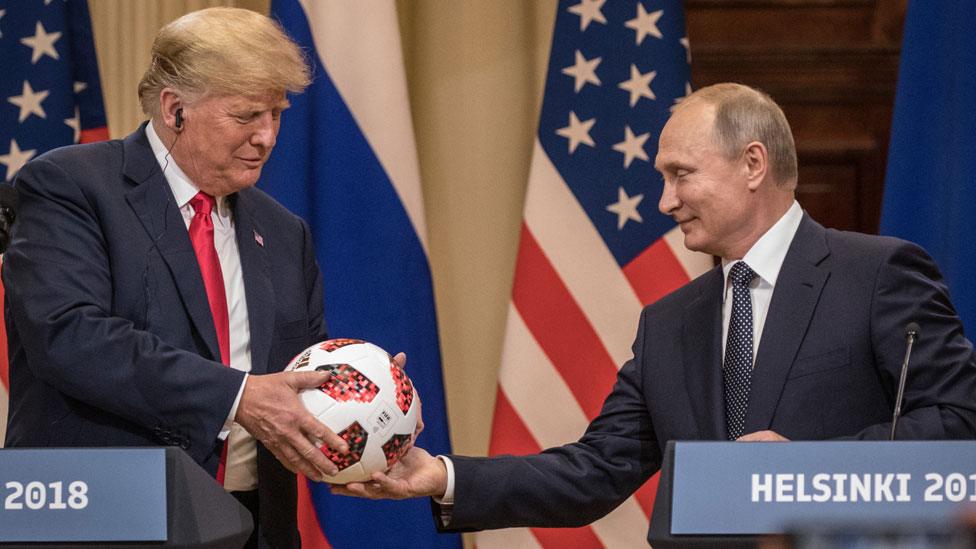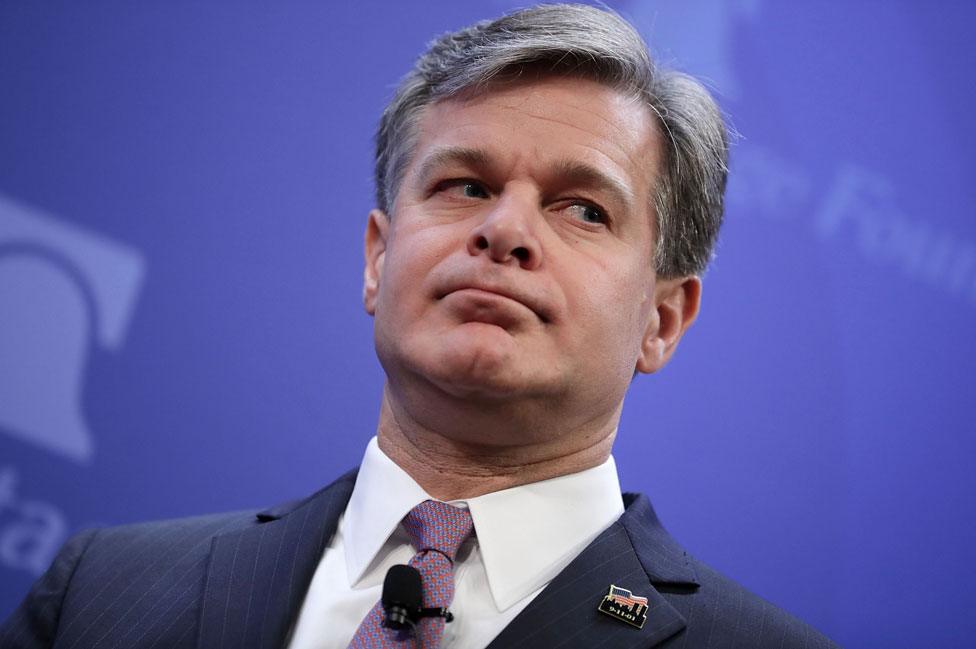Helsinki aftershocks jolt US security elite
- Published

For a few days in July, a slice of America's national security elite decamps to the Rocky Mountains.
The dress code at the Aspen Security Forum in Colorado is strictly casual - a tie would probably get you ejected.
"Summer camp for nerds" was how one participant jokingly described it.
This year a forest fire made the flight up to the town - at 8,000ft (2,400m) above sea level - even more dramatic than usual.
You could smell the smoke as flights made their way in to land at the small airport. And the political setting for this year's forum was as striking and combustible as the scenery.
At the start of the week, President Donald Trump appeared to side with President Vladimir Putin against his own intelligence community over their assessment that Russia had interfered in the 2016 election.
That day, Director of National Intelligence Dan Coats issued a statement saying the intelligence community stood by its original conclusions. A number of Republicans who had been supportive of the president - and some commentators on FOX News - vocally expressed their concerns.
The next day, President Trump made an awkward retraction of his original claim in front of the cameras (described by some as a "hostage video" because it looked like he had been coerced into making the statement).
Trump says he "misspoke" at Putin summit, but is it too late? Anthony Zurcher explains
The day after that retraction, Aspen Security Forum opened with the FBI director on stage and the aftershocks of Helsinki still being felt.
"My view has not changed, which is that Russia attempted to interfere with the last election and that it continues to engage in malign influence operations to this day," said Christopher Wray.
The FBI was involved in a huge range of activities around the country, he said, but acknowledged that the Washington political drama was what people were focused on.
Other officials have been asked the same question about whether they agreed with the US intelligence assessment, with journalists and participants parsing each word to see how much distance they might be willing to put between themselves and the White House.
Some political appointees have been more cautious than others and there have also been voices of support for elements of Trump's foreign policy over Iran, China and challenging Nato allies over their spending.

Mr Wray took over from James Comey as FBI boss in August 2017
One of the questions posed to serving officials has been, "Have you thought about resigning?" or "What would it take to make you do that?"
"I'm a low-key, understated guy, but that should not be mistaken for what my spine is made out of. I'll just leave it at that," Mr Wray answered, when pressed on whether he had come close to doing so.
One dramatic moment came when Mr Coats appeared.
The man whose job it was to know America's secrets had already admitted he did not know all the details of what had been discussed by the two leaders in Helsinki.
If he had had the opportunity, he said he would have recommended other people be in the room. (Was it possible that Mr Putin recorded the meeting? It's a risk, he replied).
Then the person interviewing Mr Coats was passed a note saying the White House had just said that President Putin had now been invited to Washington.
Dan Coats reacts to Putin visit news: 'That's going to be special...'
"Say that again?" said Mr Coats to laughter, before adding, "That's going to be special." It reinforced the sense of distance between some of those here at Aspen and the president they serve.
One former intelligence officer commented that there almost seems to be two governments - the president (and his tweets) and then the professionals carrying on their work.
But no one wants to say how sustainable that dichotomy might be. One thing foreign officials attending the forum said was that this divide left them confused as to which signals they were supposed to take seriously.
When Deputy Attorney General Rod Rosenstein took to the stage, he was granted a standing ovation by large sections of the crowd (which included members of the public for his and some other talks).
"It is nice to get out of Washington," the official responded.

You might also like:
The Soviet Spy Scandal: When Britain expelled 90 Soviet diplomats

The reason for the response from the audience was that Mr Rosenstein is the man who indicted 12 Russian intelligence officers for election interference less than a week earlier, and he has the job of overseeing and (to some extent protecting) Special Counsel Robert Mueller's investigation of possible collusion between Russia and the Trump campaign.
He also announced that in future the public would be notified if foreign attempts to interfere in elections were uncovered. The question about whether more could have been done in 2016 and why it was not is one that has repeatedly come up - with some officials from the Obama administration conceding that they had not fully appreciated what had happened at the time.
The agenda of the forum reflects current preoccupations. This time, that means Russia and cyber (and sometimes both together). One of the interesting shifts is the relative lack of emphasis on terrorism which has dominated American national security thinking since the September 11th attacks.
Other key messages were a constant warning that even though much of the current focus is on Russia, China remains the greatest challenge for US national security - including in its ability to exert economic and covert influence in America and around the world.
Officials will say they fear the focus on Russia leads to the risk that China and other challenges are overlooked. However, for the moment the dramas around the president's relationship with Russia remain centre-stage as those who deal with America's security grapple with an increasingly unfamiliar world at home as well as abroad.
The ways Trump and Putin see eye to eye